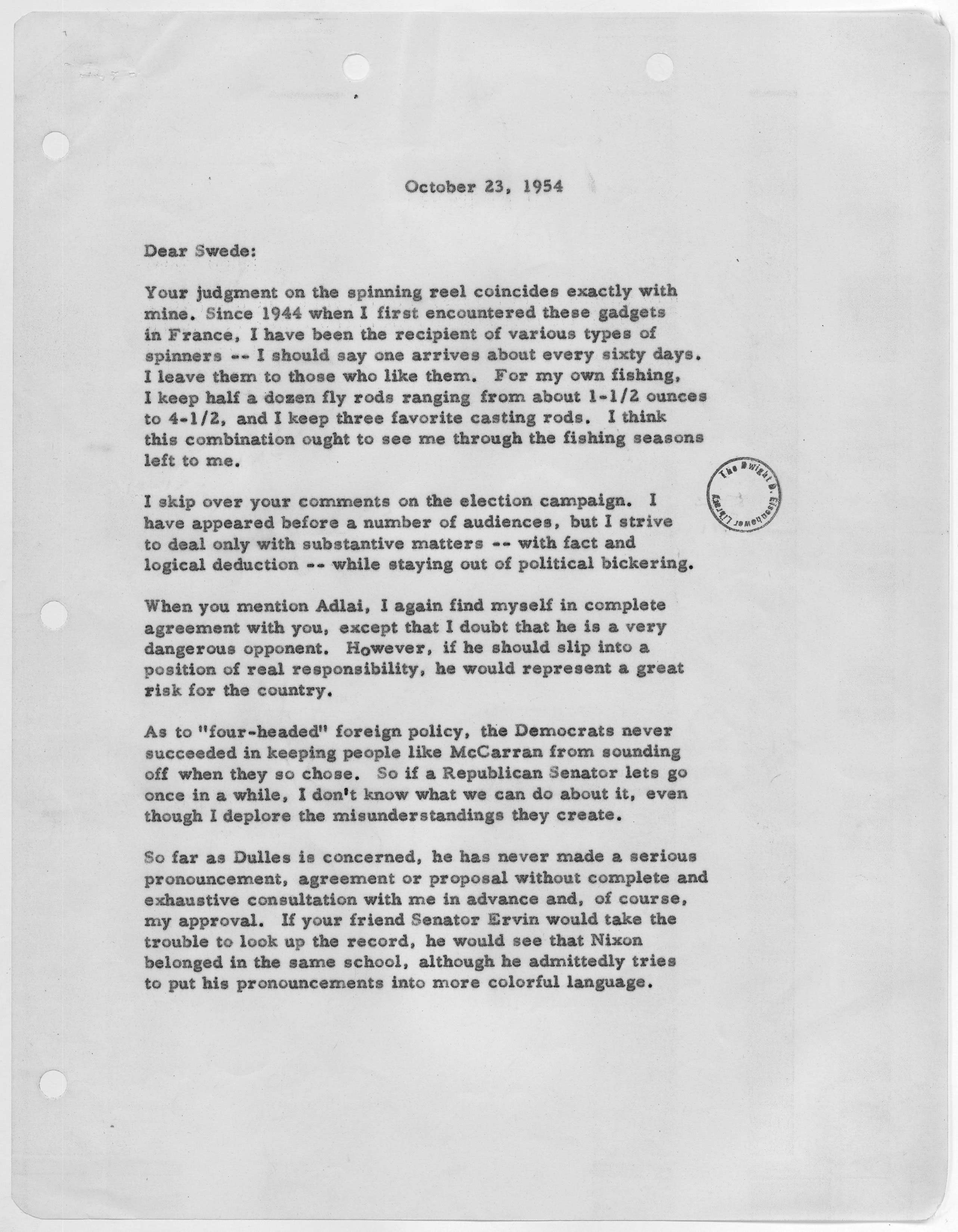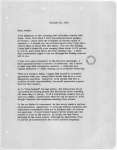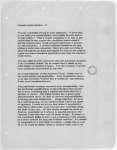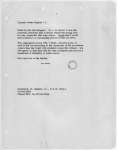Letter from President Eisenhower to E. E. "Swede" Hazlett
10/23/1954
Add to Favorites:
Add all page(s) of this document to activity:

Add only page 1 to activity:
Add only page 2 to activity:
Add only page 3 to activity:
In September 1953, President Eisenhower appointed Earl Warren, governor of California, as the new Supreme Court chief justice. Eisenhower believed Warren would follow a moderate course of action toward desegregation. His feelings regarding the appointment are detailed in the closing paragraphs of this letter he wrote to E. E. "Swede" Hazlett, a childhood friend. On the issue of segregation, Eisenhower believed that the new Warren court would "be very moderate and accord a maximum initiative to local courts."
The letter also touches upon the topics of fishing rods, Adlai Stevenson, party unity, John Foster Dulles, Richard M. Nixon, Indo-China, and Mendes-France.
The letter also touches upon the topics of fishing rods, Adlai Stevenson, party unity, John Foster Dulles, Richard M. Nixon, Indo-China, and Mendes-France.
Transcript
October 23, 1954Dear Swede:
Your judgement on the spinning reel coincides exactly with mine. Since 1944 when I first encountered these gadgets in France, I have been the recipient of various types of spinners -- I should say one arrives about every sixty days. I leave them to those who like them. For my own fishing, I keep half a dozen fly rods ranging from about 1 - 1/2 ounces to 4-1/2, and I keep three favorite casting rods. I think this combination ought to see me through the fishing seasons left to me.
I skip over your comments on the election campaign. I have appeared before a number of audiences, but I strive to deal only with substantive matters -- with fact and logical deduction -- while staying out of political bickering.
When you mention Adlai, I again find myself in complete agreement with you, except that I doubt that he is a very dangerous opponent. However, if he should slip into a position of real responsibility, he would represent a great risk for the country.
As to "four-headed" foreign policy, the Democrats never succeeded in keeping people like McCarran from sounding off when they so chose. So if a Republican Senator lets go once in a while, I don't know what we can do about it, even though I deplore the misunderstandings they create.
So far as Dulles is concerned, he has never made a serious pronouncement, agreement or proposal without complete and exhaustive consultation with me in advance and, of course, my approval. If your friend Senator Ervin would take the trouble to look up the record, he would see that Nixon belonged in the same school, although he admittedly tries to put his pronouncements into more colorful language.
Captain Swede Hazlett - 2
You are somewhat wrong in your statement, "I know that at one time you contemplated some really drastic action in Indo-China." What I really attempted to do was to get established in that region the conditions under which I felt the United States could properly intervene to protect its own interests. A proper political foundation for any military action was essential. Since we could not bring it about (though we prodded and argued for almost two years). I gave not even a tentative approval to any plan for massive intervention.
You are right in your conclusion that the European situation looks somewhat better. By no means have I made up my mind finally on Mendes-France. For the moment, I accept your instinctive impression as my own.
As to appointments on the Supreme Court, I think one or two observations are applicable. Your implication seems to be that Governor Warren was a "political" appointment. It was most emphatically not.
That particular vacancy occurred most unexpectedly, and the particular qualifications in the individual that should fill it were something that I studied and lived with for a number of weeks. The Chief Justice has a great many administrative tasks, as well as obvious responsibilities involving personal leadership. Along with this, he must be a statesman and, in my opinion (since I have my share of egotism), I could not do my duty unless I appointed a man whose philosophy of government was somewhat along the lines of my own. All this finally brought me down to Warren, especially as I refused to appoint anyone to the Supreme Court who was over 62 years of age. It seems to me completely futile to try to use a Supreme Court vacancy as a mere reward for long and brilliant service. If I should be succeeded by a New Deal President, a judge who is now 69 or 70 would probably create a vacancy very soon to be
Captain Swede Hazlett - 3
filled by the left-wingers. So -- it seems to me that prudence demands that I secure relatively young men for any vacancies that may occur. I wish that I could find a number of outstanding jurists in the low 50's.
The segregation issue will, I think, become acute or tend to die out according to the character of the procedure orders that the Court will probably issue this winter. My own guess is that they will be very moderate and accord a maximum of initiative to local courts.
Give my love to the family.
As ever,
Captain E.E. Hazlett, Jr., U.S.N. (Ret.)
Forest Hills
Chapel Hill, North Carolina
This primary source comes from the Collection DDE-EPRES: Eisenhower, Dwight D.: Papers as President of the United States.
National Archives Identifier: 186601
Full Citation: Letter from President Eisenhower to E. E. 'Swede' Hazlett; 10/23/1954; Dwight D. Eisenhower Diary October 1954 (1); Dwight D. Eisenhower Diary, 1953 - 1961; Collection DDE-EPRES: Eisenhower, Dwight D.: Papers as President of the United States; Dwight D. Eisenhower Library, Abilene, KS. [Online Version, https://docsteach.org/documents/document/eisenhower-hazlett, April 16, 2024]Rights: Public Domain, Free of Known Copyright Restrictions. Learn more on our privacy and legal page.






